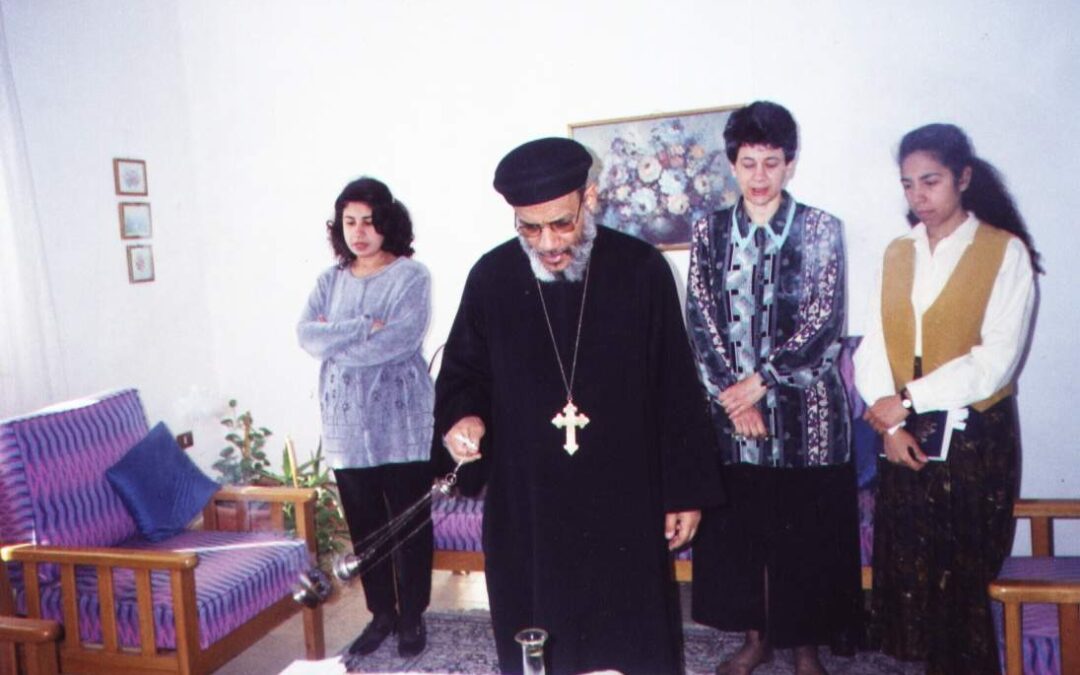
May 10, 2015 | Focolare Worldwide
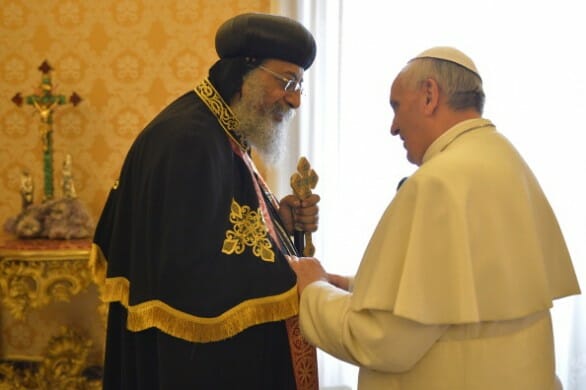 May 10, 2013. Pope Francis and Pope Tawadros II meet at the Vatican to remember the historic appointment that took place 40 years ealier between their predecessors, Pope Paul VI and Pope Shenouda III, and their Common Declaration on the one faith that is professed by churches with different traditions. During his remarks, Pope Francis stated: “I am convinced that – under the guidance of the Holy Spirit – our persevering prayer, our dialogue and the will to build communion day by day in mutual love will allow us to take important further steps towards full unity.” During an interview Pope Tawadros II stated: “I believe in the diversity in unity. Being in a garden where all the flowers are red and of the same hight, is boring. But being in a garden where I see a pink rose, a yellow rose and a white rose; and I see trees of different heights – this diversity expresses beauty and strength. When I am sitting with you I am rich of my brothers and sisters in Christ.” Coptic focolarina, Sherin, offers her thoughts: “These are words spoken by someone who has the courage to love his brothers and sisters, to shorten the distance and time in favour of understanding and renewed sharing after years of distance, enabling the two Churches to take up a path of peace and brotherhood. It will not be possible to erase these words from memory nor from the history of ecumenism until the churches rejoice on the day of the full unity of thier children.” The 2013 visit of Pope Tawadros II had been the first, following his election. Perhaps he wished to pay a visit to the Successor of Peter, Pope Francis. It was the second historic visit of a Coptic Pope to the Pope of Rome, that helped to lessen the distance between the two Churches.
May 10, 2013. Pope Francis and Pope Tawadros II meet at the Vatican to remember the historic appointment that took place 40 years ealier between their predecessors, Pope Paul VI and Pope Shenouda III, and their Common Declaration on the one faith that is professed by churches with different traditions. During his remarks, Pope Francis stated: “I am convinced that – under the guidance of the Holy Spirit – our persevering prayer, our dialogue and the will to build communion day by day in mutual love will allow us to take important further steps towards full unity.” During an interview Pope Tawadros II stated: “I believe in the diversity in unity. Being in a garden where all the flowers are red and of the same hight, is boring. But being in a garden where I see a pink rose, a yellow rose and a white rose; and I see trees of different heights – this diversity expresses beauty and strength. When I am sitting with you I am rich of my brothers and sisters in Christ.” Coptic focolarina, Sherin, offers her thoughts: “These are words spoken by someone who has the courage to love his brothers and sisters, to shorten the distance and time in favour of understanding and renewed sharing after years of distance, enabling the two Churches to take up a path of peace and brotherhood. It will not be possible to erase these words from memory nor from the history of ecumenism until the churches rejoice on the day of the full unity of thier children.” The 2013 visit of Pope Tawadros II had been the first, following his election. Perhaps he wished to pay a visit to the Successor of Peter, Pope Francis. It was the second historic visit of a Coptic Pope to the Pope of Rome, that helped to lessen the distance between the two Churches. 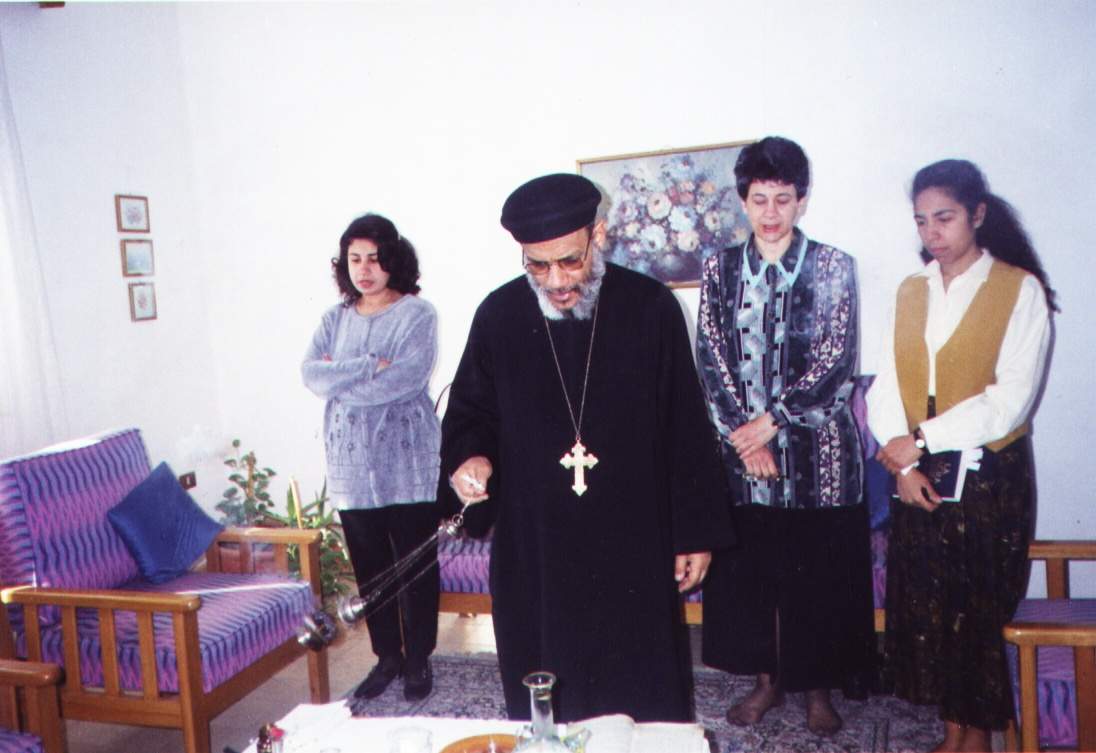 “That encounter between those two great men of God is still alive in my memory as, under the guidance of the Holy Spirit, they continue to conduct their flock towards the one Church that will come in God’s time. The memory of their fraternal embrace and the mutual love that could be visibly seen between them fills me with immense joy. I join my sisters and brothers of both Churches in celebrating this occasion, and with enthusiasm I look towards the near future, confident in the steps that will draw us closer and closer. This is a cause of great rejoicing for the entire Church! It encourages me to live for unity even more, a possibility that had fascinated me years ago when I met the Focolare Movement where I discovered the ‘precious pearl’ of the Gospel, for which you sell everything you have. I share this life in focolare with sisters from various Churches, and this is where I experience the joy of the Risen One, a sign of what the Church will be in its full unity. Each day we pray, work, share moments of suffering as Pope Francis said when he spoke about the ecumenism of suffering, and it makes us grow in love and mutual respect, believing that on the Cross, Jesus has overcome all our divisions and filled every void. I am grateful for the many people across the world with whom I share this experience. We live and pray for this unity, that it might be experienced and lived by everyone.” Sherin, focolare, Sohag, Egypt
“That encounter between those two great men of God is still alive in my memory as, under the guidance of the Holy Spirit, they continue to conduct their flock towards the one Church that will come in God’s time. The memory of their fraternal embrace and the mutual love that could be visibly seen between them fills me with immense joy. I join my sisters and brothers of both Churches in celebrating this occasion, and with enthusiasm I look towards the near future, confident in the steps that will draw us closer and closer. This is a cause of great rejoicing for the entire Church! It encourages me to live for unity even more, a possibility that had fascinated me years ago when I met the Focolare Movement where I discovered the ‘precious pearl’ of the Gospel, for which you sell everything you have. I share this life in focolare with sisters from various Churches, and this is where I experience the joy of the Risen One, a sign of what the Church will be in its full unity. Each day we pray, work, share moments of suffering as Pope Francis said when he spoke about the ecumenism of suffering, and it makes us grow in love and mutual respect, believing that on the Cross, Jesus has overcome all our divisions and filled every void. I am grateful for the many people across the world with whom I share this experience. We live and pray for this unity, that it might be experienced and lived by everyone.” Sherin, focolare, Sohag, Egypt
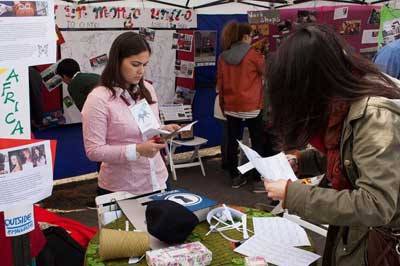
May 9, 2015 | Focolare Worldwide, Senza categoria
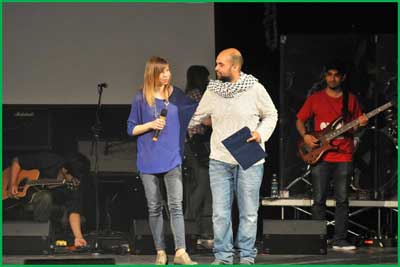 “During these hours in which we are literally bombarded with violence, war, and indifference, we wish to powerfully testify that there is another way, because there is!” This was the introduction that came from the stage of the Auditorium of Loppiano, Italy where Nino, Nahomi, Luigi and Anna had held a two hour long discussion with 1,400 young people. The 42cnd Meeting of young Italians of the Focolare was held on the 1st of May in the permanent Mariapolis of Loppiano, Italy. This year’s title was: OUTSIDE, Look, Choose, Be.” Many proposals were presented by the Young For A United World in support of a culture of fraternity, as a way of emerging from personal and social inertia and bring change to the world. Their “Fragments of Unity” Expo highlighted solidarity and social involvement, through a network of organisations which the young people run. One powerful testimony: “My name is Kareem. I’m Palestinian. I’m 23 years old with a degree in Administration. After the fall of Arafat’s government things began to be difficult for us Christians on the Garza Strip. At that time there were around 2000 of us out of a population of one and a half million. Then our numbers dwindled. Two churches were bombed. The war began in 2008. One day, a bomb exploded near me, and I was thrown to the ground. So much destruction, so many dead! I first tried to go to my father at the United Nations office because it seemed a safe place, but it wasn’t possible. It took me four hours to reach my home, having to walk over many dead bodies. My mother was in tears, because she hadn’t heard from me. We lived through 28 days of that constant tension. Then we managed to leave the Garza Strip and get into Jordan. With the people from the Focolare, experiencing such a life of fraternity, I was little by little able to overcome the powerful trauma and to believe that with love we could build a world of peace. I’ve been in Loppiano for seven months. Living with young people from so many different cultures, religions and experiences is something new for me, because we didn’t have any outside contacts in Gaza. But now, as I try to open myself and be accepting of others, I feel at home; I’ve discovered the treasure I’ve been searching for.”
“During these hours in which we are literally bombarded with violence, war, and indifference, we wish to powerfully testify that there is another way, because there is!” This was the introduction that came from the stage of the Auditorium of Loppiano, Italy where Nino, Nahomi, Luigi and Anna had held a two hour long discussion with 1,400 young people. The 42cnd Meeting of young Italians of the Focolare was held on the 1st of May in the permanent Mariapolis of Loppiano, Italy. This year’s title was: OUTSIDE, Look, Choose, Be.” Many proposals were presented by the Young For A United World in support of a culture of fraternity, as a way of emerging from personal and social inertia and bring change to the world. Their “Fragments of Unity” Expo highlighted solidarity and social involvement, through a network of organisations which the young people run. One powerful testimony: “My name is Kareem. I’m Palestinian. I’m 23 years old with a degree in Administration. After the fall of Arafat’s government things began to be difficult for us Christians on the Garza Strip. At that time there were around 2000 of us out of a population of one and a half million. Then our numbers dwindled. Two churches were bombed. The war began in 2008. One day, a bomb exploded near me, and I was thrown to the ground. So much destruction, so many dead! I first tried to go to my father at the United Nations office because it seemed a safe place, but it wasn’t possible. It took me four hours to reach my home, having to walk over many dead bodies. My mother was in tears, because she hadn’t heard from me. We lived through 28 days of that constant tension. Then we managed to leave the Garza Strip and get into Jordan. With the people from the Focolare, experiencing such a life of fraternity, I was little by little able to overcome the powerful trauma and to believe that with love we could build a world of peace. I’ve been in Loppiano for seven months. Living with young people from so many different cultures, religions and experiences is something new for me, because we didn’t have any outside contacts in Gaza. But now, as I try to open myself and be accepting of others, I feel at home; I’ve discovered the treasure I’ve been searching for.”  “After the 2010 earthquake in Haiti which caused the death of more than 220 thousand people, thousands of Haitians migrated to Brazil,” says Joao from Florianopolis, in south Brazil. “Many of them have university degrees but, since they don’t speak Portuguese, they are only able to find work as bricklayers, and are often paid very little and treated with scorn. We asked ourselves what could be done. We began by gathering clothing and foodstuffs. We felt a bit awkward, because they only spoke French and Creole, and we were unfamiliar with their culture. But our strong desire to practice the Gospel sentence: “I was a stranger and you welcomed me,” overcame all the obstacles. Little by little we got to know them and also their problems. The first was language. We began offering them Portuguese lessons with slides and music. Then we helped them to obtain their documents and enrol in free technical training courses that are offered by the government, so that they could find employment and a better life. We held cultural nights, with food, song and dance from their country. We went to the seashore and played football together. . . We have begun to build an association to take advantage of all the possible opportunities offered by institutions in favour of their full insertion into local society. Not everything has been worked out and we still have a lot of work ahead of us, but it seems that a seed of fraternity has been planted.” This has been a glimpse of the 2015 Meeting, rich with testimonies and many concrete proposals for responding to the urgent needs of many people. Meanwhile, a network of young people, associations, and organisations has already been very active for several years in Italy, operating at many levels of the social fabric, in what Pope Francis has called the existential peripheries: “We want to bring into the light this undergrowth of solidarity that is building a present and future of peace, but is not well enough known,” the young people from the Focolare explain.
“After the 2010 earthquake in Haiti which caused the death of more than 220 thousand people, thousands of Haitians migrated to Brazil,” says Joao from Florianopolis, in south Brazil. “Many of them have university degrees but, since they don’t speak Portuguese, they are only able to find work as bricklayers, and are often paid very little and treated with scorn. We asked ourselves what could be done. We began by gathering clothing and foodstuffs. We felt a bit awkward, because they only spoke French and Creole, and we were unfamiliar with their culture. But our strong desire to practice the Gospel sentence: “I was a stranger and you welcomed me,” overcame all the obstacles. Little by little we got to know them and also their problems. The first was language. We began offering them Portuguese lessons with slides and music. Then we helped them to obtain their documents and enrol in free technical training courses that are offered by the government, so that they could find employment and a better life. We held cultural nights, with food, song and dance from their country. We went to the seashore and played football together. . . We have begun to build an association to take advantage of all the possible opportunities offered by institutions in favour of their full insertion into local society. Not everything has been worked out and we still have a lot of work ahead of us, but it seems that a seed of fraternity has been planted.” This has been a glimpse of the 2015 Meeting, rich with testimonies and many concrete proposals for responding to the urgent needs of many people. Meanwhile, a network of young people, associations, and organisations has already been very active for several years in Italy, operating at many levels of the social fabric, in what Pope Francis has called the existential peripheries: “We want to bring into the light this undergrowth of solidarity that is building a present and future of peace, but is not well enough known,” the young people from the Focolare explain.
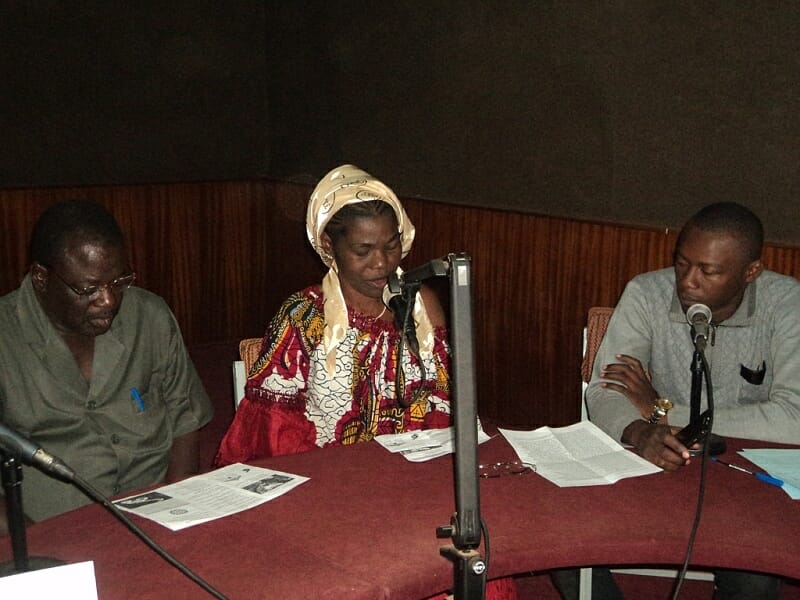
May 8, 2015 | Focolare Worldwide
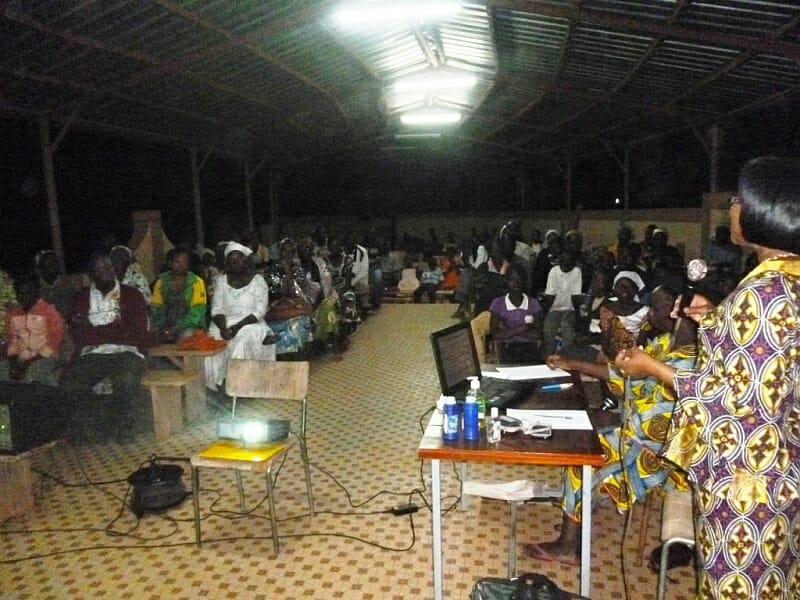 Bobo Dioulasso is the second city of Burkina Faso, the closest to Bamako, capital of Mali, where some cases of Ebola had been detected. There is a dynamic social and economic relationship between the two cities, with a continual movement of people and merchandise. “We need to act urgently to reduce at best the risk of the virus reaching also Burkina – wrote the Ebola awareness team of the Focolare Movement in Bobo Dioulasso. We practically had to inform as many people as possible on the preventive measures, but the political situation in the country is such that government interventions are not always possible.” “So we decided to act on our own. Félicité is a volunteer epidemiological doctor at the Healthcare Organisation for West Africa (OOAS). Her specific role is to train the healthcare practitioners in fighting epidemic outbreaks, since she herself has worked in countries like Guinea Conakry, Liberia, and Sierra Leone. Félicité immediately offered her services.”
Bobo Dioulasso is the second city of Burkina Faso, the closest to Bamako, capital of Mali, where some cases of Ebola had been detected. There is a dynamic social and economic relationship between the two cities, with a continual movement of people and merchandise. “We need to act urgently to reduce at best the risk of the virus reaching also Burkina – wrote the Ebola awareness team of the Focolare Movement in Bobo Dioulasso. We practically had to inform as many people as possible on the preventive measures, but the political situation in the country is such that government interventions are not always possible.” “So we decided to act on our own. Félicité is a volunteer epidemiological doctor at the Healthcare Organisation for West Africa (OOAS). Her specific role is to train the healthcare practitioners in fighting epidemic outbreaks, since she herself has worked in countries like Guinea Conakry, Liberia, and Sierra Leone. Félicité immediately offered her services.” 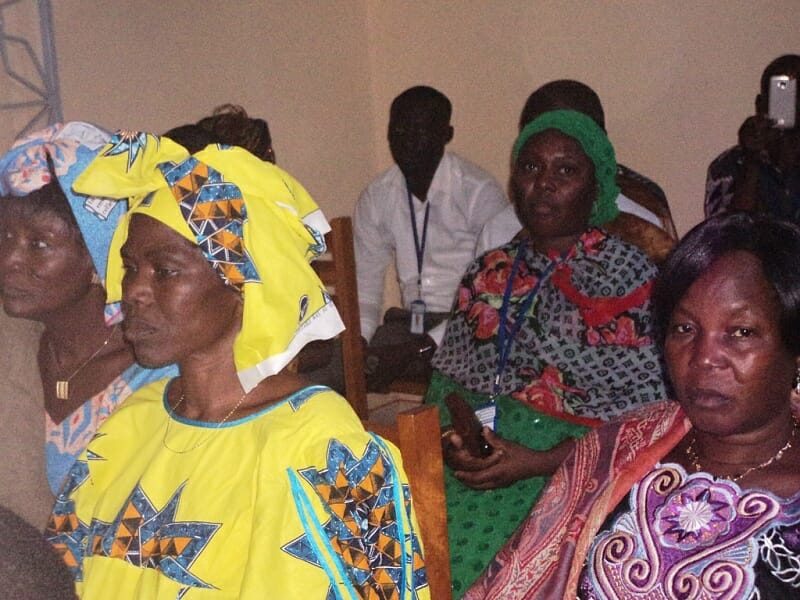 “The first thing we thought of doing was to notify the Bishop who was not in town at that time. We then went to speak to the Vicar Genera”l, Abbé Sylvestre, who assured us of the full support of the diocese, and in exhorting the clergy and faithful about the necessary precautionary measures to take. Carlo, a focolarino doctor of the dispensary of Mariapolis Victoria (Man) of the Ivory Coast, sent us some audiovisuals which we copied for the various youth and adult groups that would work for the awareness campaign. We also sent this material to a priest and a teacher in two other cities (Dedougou and Toussiana), interested in our campaign. Félicité took charge of forming groups, with the help of 15 students of the western countries of Africa sent by the OOAS, some of whom are Muslims.” “The campaign started in November 2014, but before that was already taken up during the meetings of the Focolare Movement. Campaigning was done in parishes in order to expand towards the various districts, and during a big youth meet organised by the diocese of Bobo Dioulasso itself. On Sundays we went to speak also in the churches. We spoke in a private radio broadcast, and in those of the national and also diocesan radios, in the three languages spoken: French, Dioula and Moré.”
“The first thing we thought of doing was to notify the Bishop who was not in town at that time. We then went to speak to the Vicar Genera”l, Abbé Sylvestre, who assured us of the full support of the diocese, and in exhorting the clergy and faithful about the necessary precautionary measures to take. Carlo, a focolarino doctor of the dispensary of Mariapolis Victoria (Man) of the Ivory Coast, sent us some audiovisuals which we copied for the various youth and adult groups that would work for the awareness campaign. We also sent this material to a priest and a teacher in two other cities (Dedougou and Toussiana), interested in our campaign. Félicité took charge of forming groups, with the help of 15 students of the western countries of Africa sent by the OOAS, some of whom are Muslims.” “The campaign started in November 2014, but before that was already taken up during the meetings of the Focolare Movement. Campaigning was done in parishes in order to expand towards the various districts, and during a big youth meet organised by the diocese of Bobo Dioulasso itself. On Sundays we went to speak also in the churches. We spoke in a private radio broadcast, and in those of the national and also diocesan radios, in the three languages spoken: French, Dioula and Moré.”  “This campaign gave us the opportunity to meet many people. When Jean-Bernard explained to his neighbours what he wanted to do in the district, everyone offered help: some attended to the amplifiers, some invited a singer to entertain, another took care of the transport of the material and others brought water to drink. At the presentation there were about 200 people. Word spread also to the neighbouring districts and Jean-Bernard had to repeat the program several times. In one of these occasions, a professional nurse offered to answer the questions of the audience. In another meeting, an expert of local tongues came and was an excellent translator. The officers of the Town Hall, who had given the permit for these meetings, expressed their gratitude for all this.» “In the meantime, we heard from Mali that the disease had been overcome. So the risk had been drastically reduced. The important thing now is to continue to comply with the preventive measures. It was a great opportunity to learn to work together for our people. We must continue.”
“This campaign gave us the opportunity to meet many people. When Jean-Bernard explained to his neighbours what he wanted to do in the district, everyone offered help: some attended to the amplifiers, some invited a singer to entertain, another took care of the transport of the material and others brought water to drink. At the presentation there were about 200 people. Word spread also to the neighbouring districts and Jean-Bernard had to repeat the program several times. In one of these occasions, a professional nurse offered to answer the questions of the audience. In another meeting, an expert of local tongues came and was an excellent translator. The officers of the Town Hall, who had given the permit for these meetings, expressed their gratitude for all this.» “In the meantime, we heard from Mali that the disease had been overcome. So the risk had been drastically reduced. The important thing now is to continue to comply with the preventive measures. It was a great opportunity to learn to work together for our people. We must continue.”
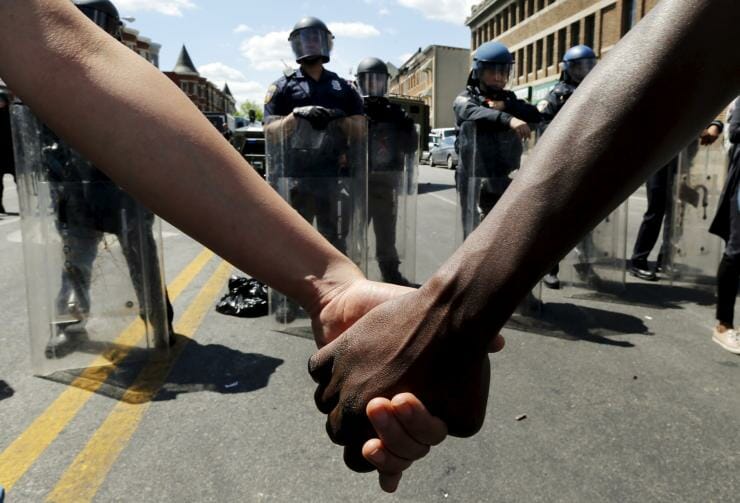
May 7, 2015 | Focolare Worldwide
 “The events that came about have stirred up the support of the citizens. Many leaders, religious groups and civil organisations decided to work together to clean the streets and buildings and to help in various ways, revealing the positive side of the city, though deeply offended,» Lucia, Co-Director of the Focolare Movement wrote from Washington. We all know about the people’s protests triggered in Baltimore last month, which are still ongoing, after the death of the 25-year-old Afro-American Freddie Gray while he was under arrest. Baltimore, the biggest city of Maryland with more than 600,000 inhabitants is a melting pot of ethnic groups, especially Afro-Americans. Leonie and Jennifer, two volunteers of the Focolare, live in the city centre. “The situation is still very tense, and yesterday the mayor closed the schools and the governor of the state deployed the armed forces. However, all those we know are fine.” Leonie lives close to the place of the clashes and teaches in a primary school of almost all Afro students and where there is great poverty. “On TV I saw one of my third-year elementary students participate in the sacking of buildings and properties.” “We cannot remain indifferent; we want to do something concrete, though aware that our contribution to establish true relationships between people is urgent, more than ever. Furthermore, every act of love builds new relationships that help foster fraternity between people,” wrote Marilena and Mike. “In the meantime we participate in the various moments of prayer organised by the religious authorities, starting from the Mass that Archbishop Lori will celebrate in our district, to invoke peace.” “I returned to school today,” Leonie recounts, “and tried to see my students (those who participated in the plunders) with ‘new eyes’.I contacted an Afro-American Muslim teacher who knows two black religious representatives in the school to offer our solidarity, and we agreed to work together.” Jennifer works in a company where almost all are whites. «A colleague of mine who lives close to the place where violence broke out, came to visit me today, and told me of her suffering in seeing all these events, but did not have the courage to mention it to anyone for fear of being marginalised by her colleagues. It was the occasion to tell her that we can start from ourselves and build a dialogue with all, one at a time, and in this way spread a new mentality. My colleague is not a practicing believer, but her face lit up and she told me that this is precisely what she also wants to do.” Meanwhile, the leaders of the various religious communities have started to work together for peace. “I was invited by the Imam Talib of the mosque of Washington, to give my testimony on the the 5th of May as a focolarina and the ideal that inspires us,” Lucia continued. “He wanted me to speak in a meeting open to the public, something they had organised with the District Procurator, to integrate the religious perspective as an essential dimension to subdue the violence. The event was entitled: Heal the Hurt, Heal the Heart. It seemed to be a great possibility for dialogue between religions but also an opportunity to show, more than the clashing, the richness of our society’s ethnic diversities.”
“The events that came about have stirred up the support of the citizens. Many leaders, religious groups and civil organisations decided to work together to clean the streets and buildings and to help in various ways, revealing the positive side of the city, though deeply offended,» Lucia, Co-Director of the Focolare Movement wrote from Washington. We all know about the people’s protests triggered in Baltimore last month, which are still ongoing, after the death of the 25-year-old Afro-American Freddie Gray while he was under arrest. Baltimore, the biggest city of Maryland with more than 600,000 inhabitants is a melting pot of ethnic groups, especially Afro-Americans. Leonie and Jennifer, two volunteers of the Focolare, live in the city centre. “The situation is still very tense, and yesterday the mayor closed the schools and the governor of the state deployed the armed forces. However, all those we know are fine.” Leonie lives close to the place of the clashes and teaches in a primary school of almost all Afro students and where there is great poverty. “On TV I saw one of my third-year elementary students participate in the sacking of buildings and properties.” “We cannot remain indifferent; we want to do something concrete, though aware that our contribution to establish true relationships between people is urgent, more than ever. Furthermore, every act of love builds new relationships that help foster fraternity between people,” wrote Marilena and Mike. “In the meantime we participate in the various moments of prayer organised by the religious authorities, starting from the Mass that Archbishop Lori will celebrate in our district, to invoke peace.” “I returned to school today,” Leonie recounts, “and tried to see my students (those who participated in the plunders) with ‘new eyes’.I contacted an Afro-American Muslim teacher who knows two black religious representatives in the school to offer our solidarity, and we agreed to work together.” Jennifer works in a company where almost all are whites. «A colleague of mine who lives close to the place where violence broke out, came to visit me today, and told me of her suffering in seeing all these events, but did not have the courage to mention it to anyone for fear of being marginalised by her colleagues. It was the occasion to tell her that we can start from ourselves and build a dialogue with all, one at a time, and in this way spread a new mentality. My colleague is not a practicing believer, but her face lit up and she told me that this is precisely what she also wants to do.” Meanwhile, the leaders of the various religious communities have started to work together for peace. “I was invited by the Imam Talib of the mosque of Washington, to give my testimony on the the 5th of May as a focolarina and the ideal that inspires us,” Lucia continued. “He wanted me to speak in a meeting open to the public, something they had organised with the District Procurator, to integrate the religious perspective as an essential dimension to subdue the violence. The event was entitled: Heal the Hurt, Heal the Heart. It seemed to be a great possibility for dialogue between religions but also an opportunity to show, more than the clashing, the richness of our society’s ethnic diversities.”
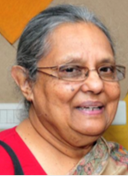
May 6, 2015 | Focolare Worldwide
 “Over the last few days in South Africa, there has been a lot of unrest, violence, violation of human rights… there are some South Africans who have refused to accommodate other brothers of other African nations in the country. It is difficult to see why these sparks of violence have emerged so strongly. We really need to promote tolerance towards the differences in the groups and communities everywhere. The migrants live in fear and many have already returned to their countries of origin, wrote Jacira from Johannesburg. This was the atmosphere in which the 7th death anniversary of Chiara Lubich (22/01/1920 – 14/03/2008) was held, and the seminar was entitled “Religion at the Service of Peace.” The speech of Ela Gandhi, niece of Mahatma, was very meaningful. On her many trips to Italy she had been impressed by the figure of Chiara Lubich and the spirituality of unity, as she so extensively stressed in her long speech. Among other things she also affirmed: “Upon acknowledging, like Gandhiji, that no results can be reached when people are jobless, and lack food, homes and clothing, Chiara conceived the idea of the Economy of Communion in liberty. Taking care of one another is her strong exhortation!” And further explained: “It is love for the others, in the form of mercy, love that opens hearts and hands to embrace the derelicts, the poor, those who have been marginalised from life and the repentant sinners.” “If we believe we are practicing our religion faithfully, when then is there so many battles, wars, abuse of power and sufferings perpetrated by man against man and indescribable atrocities committed by man in this world?” she asked, and strongly affirmed: “Every community of faithful must take the responsibility of correcting the erroneous interpretations of their own faith, and must not abandon their faith.” “Here in South Africa, during the apartheid period which was based on an erroneous interpretation of the Bibles,” according to Ms Ela Gandhi, “Our Christian brothers and sisters agreed with one another to produce the Kairos Document. This document affirms that “the problem in South Africa is not just that of a personal fault, it is a problem of structural injustice.” And Ms Ela Gandhi thus concluded: “Today, when the world and also our country is undergoing a high rate of violence and madness, anger and destruction, poverty and misery, we need to turn our gaze once again toward our concept of Ubuntu and see in what way each one of us can start introducing in his life, the agape, bhavana and many other similar concepts that refer to pure love so as to help create a better world.” More than ever today, to give our own contribution, the members of the Focolare in this country of such immense distances, commit themselves to reach the farthest communities to share the message of peace and unity, fruit of the Gospel lived.
“Over the last few days in South Africa, there has been a lot of unrest, violence, violation of human rights… there are some South Africans who have refused to accommodate other brothers of other African nations in the country. It is difficult to see why these sparks of violence have emerged so strongly. We really need to promote tolerance towards the differences in the groups and communities everywhere. The migrants live in fear and many have already returned to their countries of origin, wrote Jacira from Johannesburg. This was the atmosphere in which the 7th death anniversary of Chiara Lubich (22/01/1920 – 14/03/2008) was held, and the seminar was entitled “Religion at the Service of Peace.” The speech of Ela Gandhi, niece of Mahatma, was very meaningful. On her many trips to Italy she had been impressed by the figure of Chiara Lubich and the spirituality of unity, as she so extensively stressed in her long speech. Among other things she also affirmed: “Upon acknowledging, like Gandhiji, that no results can be reached when people are jobless, and lack food, homes and clothing, Chiara conceived the idea of the Economy of Communion in liberty. Taking care of one another is her strong exhortation!” And further explained: “It is love for the others, in the form of mercy, love that opens hearts and hands to embrace the derelicts, the poor, those who have been marginalised from life and the repentant sinners.” “If we believe we are practicing our religion faithfully, when then is there so many battles, wars, abuse of power and sufferings perpetrated by man against man and indescribable atrocities committed by man in this world?” she asked, and strongly affirmed: “Every community of faithful must take the responsibility of correcting the erroneous interpretations of their own faith, and must not abandon their faith.” “Here in South Africa, during the apartheid period which was based on an erroneous interpretation of the Bibles,” according to Ms Ela Gandhi, “Our Christian brothers and sisters agreed with one another to produce the Kairos Document. This document affirms that “the problem in South Africa is not just that of a personal fault, it is a problem of structural injustice.” And Ms Ela Gandhi thus concluded: “Today, when the world and also our country is undergoing a high rate of violence and madness, anger and destruction, poverty and misery, we need to turn our gaze once again toward our concept of Ubuntu and see in what way each one of us can start introducing in his life, the agape, bhavana and many other similar concepts that refer to pure love so as to help create a better world.” More than ever today, to give our own contribution, the members of the Focolare in this country of such immense distances, commit themselves to reach the farthest communities to share the message of peace and unity, fruit of the Gospel lived.
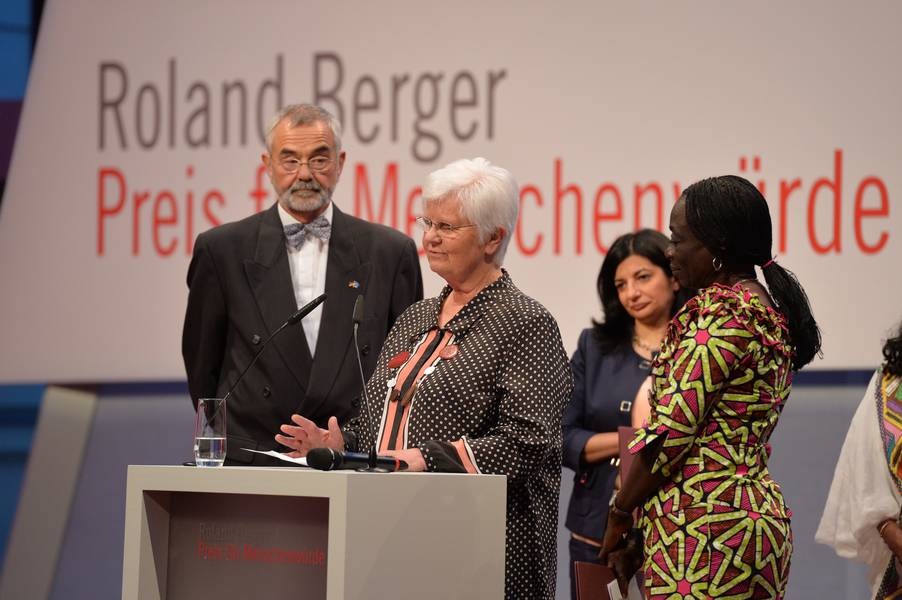
May 4, 2015 | Focolare Worldwide
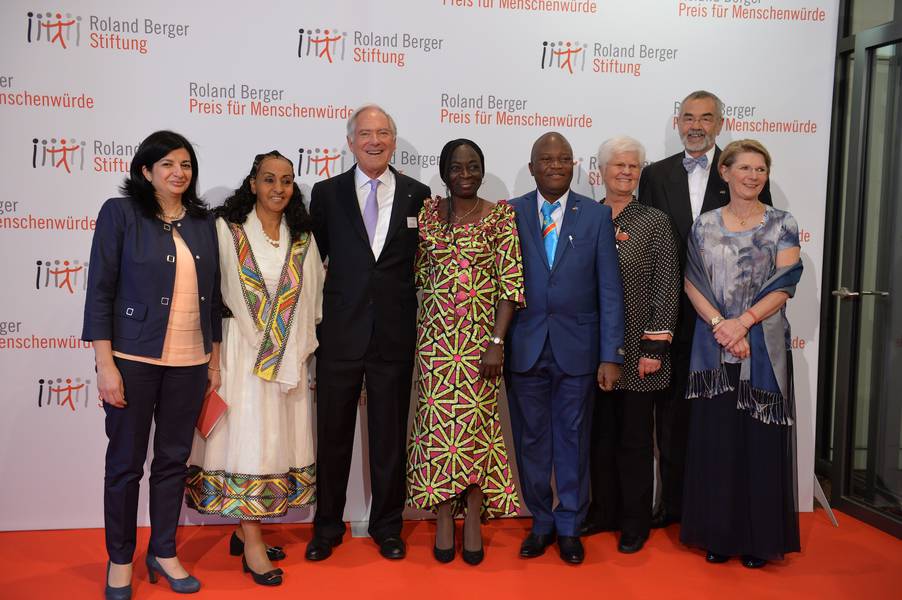 “I was one of the Petite Flamme children, and schooling gave me the chance to do something fulfilling in life,” recounted Trésor, 29, and currently a mathematics student at the National College, in a video projected during the awards ceremony held last 29 April at the Jewish Museum of Berlin. Jean Paul Ngandu Masamuna, 31, Engineer and seventh of nine children, added: “When I was a child, my father had gone to war, and my mother had nothing to bring us up with. We had to fight for survival and Petite Flamme gave me daily sustenance and the possibility to study. My friends went to Europe but every time I speak to them, they tell me that they have nothing, and being unemployed and without documents, they do not have the liberty I have, and that their dreams have not been fulfilled. I love living in Kinshasa with my Congolese people. I want to stay and work in Africa to save the lives of many people who suffer.” Petite Flamme is a scholastic organisation of the Focolare in Congo, that offers many kids the chance to build a future in their country of origin, without needing to migrate.
“I was one of the Petite Flamme children, and schooling gave me the chance to do something fulfilling in life,” recounted Trésor, 29, and currently a mathematics student at the National College, in a video projected during the awards ceremony held last 29 April at the Jewish Museum of Berlin. Jean Paul Ngandu Masamuna, 31, Engineer and seventh of nine children, added: “When I was a child, my father had gone to war, and my mother had nothing to bring us up with. We had to fight for survival and Petite Flamme gave me daily sustenance and the possibility to study. My friends went to Europe but every time I speak to them, they tell me that they have nothing, and being unemployed and without documents, they do not have the liberty I have, and that their dreams have not been fulfilled. I love living in Kinshasa with my Congolese people. I want to stay and work in Africa to save the lives of many people who suffer.” Petite Flamme is a scholastic organisation of the Focolare in Congo, that offers many kids the chance to build a future in their country of origin, without needing to migrate. 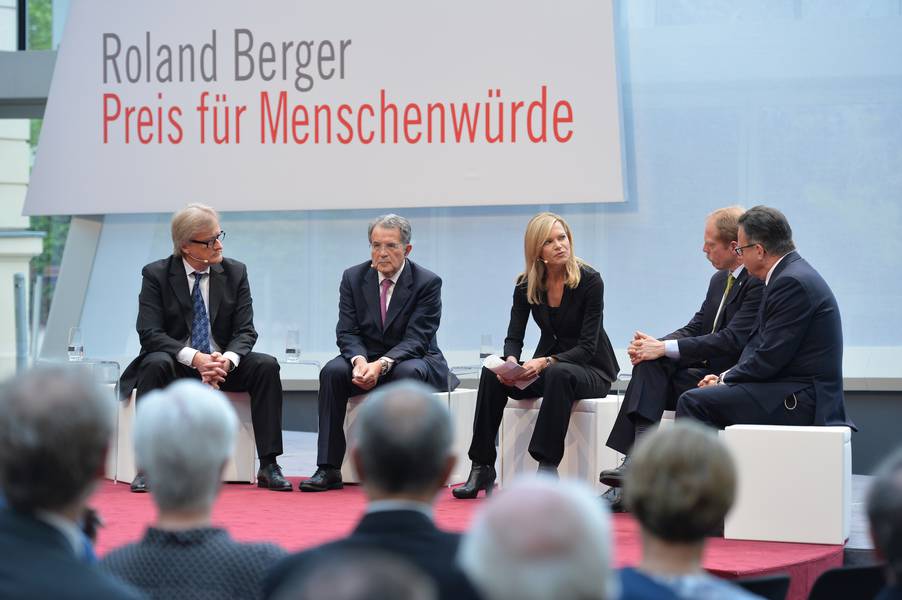 Immigration, the need to stop the carnage at sea, the urgency for political initiatives of the international community in favour of some Sub-Saharian and mid-oriental regions, were the topics discussed during the proceedings of “The Roland Berger Human Dignity Award” in Berlin. The event was attended by: the German Minister of Foreign Affairs, Frank-Walter Steinmeier, Romano Prodi, former President of the European Commission, and other exponents of the economic and political worlds. During the event, the “Roland Berger Foundation” operating in Germany in support of human rights and disadvantaged students awarded the 2015 prize, dedicated to the commitment to defend the life and dignity of refugees and forestall immigration issues. Among the winners, besides Petite Flamme, were two heroic women involved in helping refugees: Dr. Katrine Camilleri from Malta, who has been involved for years in giving refugees legal support, and Dr. Alganesc Fessaha, President of the NGO, “Gandhi,” who offers humanitarian assistance to African refugees.
Immigration, the need to stop the carnage at sea, the urgency for political initiatives of the international community in favour of some Sub-Saharian and mid-oriental regions, were the topics discussed during the proceedings of “The Roland Berger Human Dignity Award” in Berlin. The event was attended by: the German Minister of Foreign Affairs, Frank-Walter Steinmeier, Romano Prodi, former President of the European Commission, and other exponents of the economic and political worlds. During the event, the “Roland Berger Foundation” operating in Germany in support of human rights and disadvantaged students awarded the 2015 prize, dedicated to the commitment to defend the life and dignity of refugees and forestall immigration issues. Among the winners, besides Petite Flamme, were two heroic women involved in helping refugees: Dr. Katrine Camilleri from Malta, who has been involved for years in giving refugees legal support, and Dr. Alganesc Fessaha, President of the NGO, “Gandhi,” who offers humanitarian assistance to African refugees.  “It all sprang from an idea of Chiara Lubich – recounts Dada Diambu who, together with Odon Makela, coordinates the local project – when she launched the New Families’ “support from afar” project in order to cope with the difficult situation many children worldwide undergo. Petite Flamme was created in 1996 to offer education to the children of Ndolo, an extremely poor district of Kinshasa. The children are undernourished, and because of this the priority was to offer meals and necessary medical care. In the following years new centres were opened, and the scholastic cycle expanded the offer to adolescents and families, with classes for blind and deaf kids. Then the experience went to include “after-school under the tree” activities: 14 classes held under 14 trees due to the lack of other structures. Under constant development, the project centres located in the poor outskirts of Kinshasa then spread to Idiofa in Bandundu at 750 km from the capital, and to Kisandu in Bas-Kongo and Kikwit. The project is financed by various associations and NGOs, and by the Association for New Families onlus, that ensures education, medical care, and nutrition for 2,400 boys and girls, helping them to become free persons, since they have the possibility to be free from poverty and have the capacity to build a dignified life for themselves and the community. «During the European Union’s “Eufor” military mission tasked with safeguarding the elections in Congo in 2006 – explained Monika-Maria Wolff for years a resident in Congo – the rear admiral Henning Bess, head of the German soldiers and Vice-Captain of the mission got to know about “Petite Flamme.” Since then he has been involved, with his troops, in many huge aid campaigns. After the end of the mission the rear admiral continued with his wife, Julie Müller, to support Petite Flamme – along with the “support from afar” project of the New Families that has a network of over 350 German supporters.» The ceremony featured a round table on the outcomes of the recent special EU Summit on immigration, attended by Romano Prodi, Foreign Affairs Minister, Steinmeier, a representative of the UN’s High Commissioner for refugees, journalists and members of the various humanitarian organizations. The summit highlighted two solutions as the only ones possible for a sustainable support: that the International communities cooperate in a more compact and decisive way for peace, and support the initiatives aimed at resolving – following the example of Petite Flamme –the problem at its roots, and give the youth a chance to conduct a dignified life in their own countries without having to turn to escaping towards the north and wellbeing. Photo gallery
“It all sprang from an idea of Chiara Lubich – recounts Dada Diambu who, together with Odon Makela, coordinates the local project – when she launched the New Families’ “support from afar” project in order to cope with the difficult situation many children worldwide undergo. Petite Flamme was created in 1996 to offer education to the children of Ndolo, an extremely poor district of Kinshasa. The children are undernourished, and because of this the priority was to offer meals and necessary medical care. In the following years new centres were opened, and the scholastic cycle expanded the offer to adolescents and families, with classes for blind and deaf kids. Then the experience went to include “after-school under the tree” activities: 14 classes held under 14 trees due to the lack of other structures. Under constant development, the project centres located in the poor outskirts of Kinshasa then spread to Idiofa in Bandundu at 750 km from the capital, and to Kisandu in Bas-Kongo and Kikwit. The project is financed by various associations and NGOs, and by the Association for New Families onlus, that ensures education, medical care, and nutrition for 2,400 boys and girls, helping them to become free persons, since they have the possibility to be free from poverty and have the capacity to build a dignified life for themselves and the community. «During the European Union’s “Eufor” military mission tasked with safeguarding the elections in Congo in 2006 – explained Monika-Maria Wolff for years a resident in Congo – the rear admiral Henning Bess, head of the German soldiers and Vice-Captain of the mission got to know about “Petite Flamme.” Since then he has been involved, with his troops, in many huge aid campaigns. After the end of the mission the rear admiral continued with his wife, Julie Müller, to support Petite Flamme – along with the “support from afar” project of the New Families that has a network of over 350 German supporters.» The ceremony featured a round table on the outcomes of the recent special EU Summit on immigration, attended by Romano Prodi, Foreign Affairs Minister, Steinmeier, a representative of the UN’s High Commissioner for refugees, journalists and members of the various humanitarian organizations. The summit highlighted two solutions as the only ones possible for a sustainable support: that the International communities cooperate in a more compact and decisive way for peace, and support the initiatives aimed at resolving – following the example of Petite Flamme –the problem at its roots, and give the youth a chance to conduct a dignified life in their own countries without having to turn to escaping towards the north and wellbeing. Photo gallery

 May 10, 2013. Pope Francis and Pope Tawadros II meet at the Vatican to remember the historic appointment that took place 40 years ealier between their predecessors, Pope Paul VI and Pope Shenouda III, and their Common Declaration on the one faith that is professed by churches with different traditions. During his remarks, Pope Francis stated: “I am convinced that – under the guidance of the Holy Spirit – our persevering prayer, our dialogue and the will to build communion day by day in mutual love will allow us to take important further steps towards full unity.” During an interview Pope Tawadros II stated: “I believe in the diversity in unity. Being in a garden where all the flowers are red and of the same hight, is boring. But being in a garden where I see a pink rose, a yellow rose and a white rose; and I see trees of different heights – this diversity expresses beauty and strength. When I am sitting with you I am rich of my brothers and sisters in Christ.” Coptic focolarina, Sherin, offers her thoughts: “These are words spoken by someone who has the courage to love his brothers and sisters, to shorten the distance and time in favour of understanding and renewed sharing after years of distance, enabling the two Churches to take up a path of peace and brotherhood. It will not be possible to erase these words from memory nor from the history of ecumenism until the churches rejoice on the day of the full unity of thier children.” The 2013 visit of Pope Tawadros II had been the first, following his election. Perhaps he wished to pay a visit to the Successor of Peter, Pope Francis. It was the second historic visit of a Coptic Pope to the Pope of Rome, that helped to lessen the distance between the two Churches.
May 10, 2013. Pope Francis and Pope Tawadros II meet at the Vatican to remember the historic appointment that took place 40 years ealier between their predecessors, Pope Paul VI and Pope Shenouda III, and their Common Declaration on the one faith that is professed by churches with different traditions. During his remarks, Pope Francis stated: “I am convinced that – under the guidance of the Holy Spirit – our persevering prayer, our dialogue and the will to build communion day by day in mutual love will allow us to take important further steps towards full unity.” During an interview Pope Tawadros II stated: “I believe in the diversity in unity. Being in a garden where all the flowers are red and of the same hight, is boring. But being in a garden where I see a pink rose, a yellow rose and a white rose; and I see trees of different heights – this diversity expresses beauty and strength. When I am sitting with you I am rich of my brothers and sisters in Christ.” Coptic focolarina, Sherin, offers her thoughts: “These are words spoken by someone who has the courage to love his brothers and sisters, to shorten the distance and time in favour of understanding and renewed sharing after years of distance, enabling the two Churches to take up a path of peace and brotherhood. It will not be possible to erase these words from memory nor from the history of ecumenism until the churches rejoice on the day of the full unity of thier children.” The 2013 visit of Pope Tawadros II had been the first, following his election. Perhaps he wished to pay a visit to the Successor of Peter, Pope Francis. It was the second historic visit of a Coptic Pope to the Pope of Rome, that helped to lessen the distance between the two Churches.  “That encounter between those two great men of God is still alive in my memory as, under the guidance of the Holy Spirit, they continue to conduct their flock towards the one Church that will come in God’s time. The memory of their fraternal embrace and the mutual love that could be visibly seen between them fills me with immense joy. I join my sisters and brothers of both Churches in celebrating this occasion, and with enthusiasm I look towards the near future, confident in the steps that will draw us closer and closer. This is a cause of great rejoicing for the entire Church! It encourages me to live for unity even more, a possibility that had fascinated me years ago when I met the Focolare Movement where I discovered the ‘precious pearl’ of the Gospel, for which you sell everything you have. I share this life in focolare with sisters from various Churches, and this is where I experience the joy of the Risen One, a sign of what the Church will be in its full unity. Each day we pray, work, share moments of suffering as Pope Francis said when he spoke about the ecumenism of suffering, and it makes us grow in love and mutual respect, believing that on the Cross, Jesus has overcome all our divisions and filled every void. I am grateful for the many people across the world with whom I share this experience. We live and pray for this unity, that it might be experienced and lived by everyone.” Sherin, focolare, Sohag, Egypt
“That encounter between those two great men of God is still alive in my memory as, under the guidance of the Holy Spirit, they continue to conduct their flock towards the one Church that will come in God’s time. The memory of their fraternal embrace and the mutual love that could be visibly seen between them fills me with immense joy. I join my sisters and brothers of both Churches in celebrating this occasion, and with enthusiasm I look towards the near future, confident in the steps that will draw us closer and closer. This is a cause of great rejoicing for the entire Church! It encourages me to live for unity even more, a possibility that had fascinated me years ago when I met the Focolare Movement where I discovered the ‘precious pearl’ of the Gospel, for which you sell everything you have. I share this life in focolare with sisters from various Churches, and this is where I experience the joy of the Risen One, a sign of what the Church will be in its full unity. Each day we pray, work, share moments of suffering as Pope Francis said when he spoke about the ecumenism of suffering, and it makes us grow in love and mutual respect, believing that on the Cross, Jesus has overcome all our divisions and filled every void. I am grateful for the many people across the world with whom I share this experience. We live and pray for this unity, that it might be experienced and lived by everyone.” Sherin, focolare, Sohag, Egypt

 “During these hours in which we are literally bombarded with violence, war, and indifference, we wish to powerfully testify that there is another way, because there is!” This was the introduction that came from the stage of the Auditorium of
“During these hours in which we are literally bombarded with violence, war, and indifference, we wish to powerfully testify that there is another way, because there is!” This was the introduction that came from the stage of the Auditorium of 






